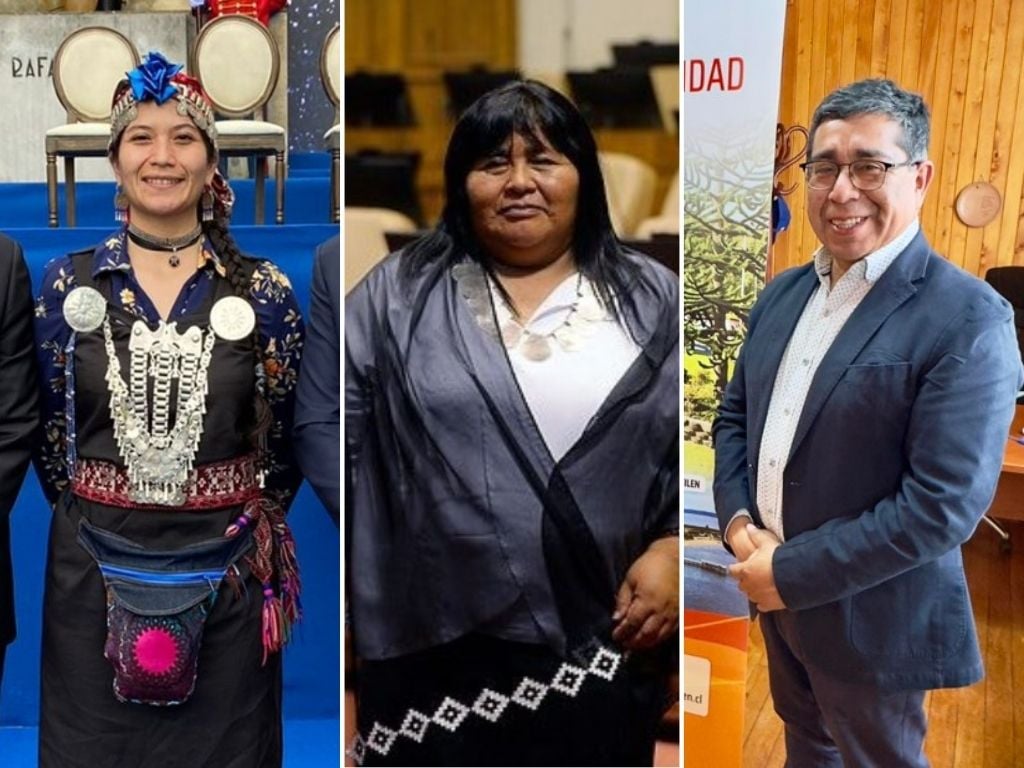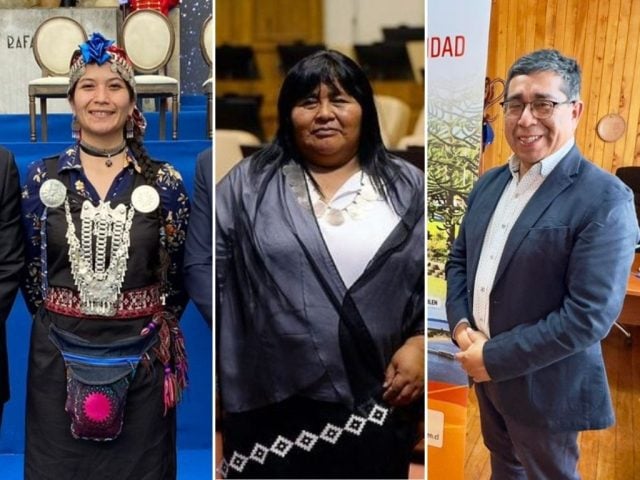Original article: Wallmapu dice presente en el Congreso: Nuyado y Ñanco son reelectas y Alex Nahuelquín se suma como nueva voz mapuche
By Raigan Nawel from Futawillimapu
Chile has recently held parliamentary and presidential elections, marking a historic moment for Wallmapu: three Mapuche representatives were elected to the Chamber of Deputies, all from Mapuche territories. Among them, Emilia Nuyado and Ericka Ñanco have secured re-election, while communicator Alex Nahuelquín makes his debut in Congress, solidifying a trend of self-representation from the territories.
In District 25 (Los Lagos Region), Emilia Nuyado Ancapichún (PS) was re-elected, establishing herself as a prominent figure with 30,571 votes (13.04%). In District 26, communicator Alex Manuel Nahuelquín Nahuelquín (PDG) achieved 30,324 votes (10.21%), becoming one of the most voted representatives within the People’s Party.
From La Araucanía, in District 23, Ericka «Coca» Ñanco Vásquez (FA) obtained 28,418 votes (6.63%), securing her re-election and reaffirming her emerging leadership as part of this new generation of Mapuche representation in Congress.

Profiles of the Elected
Emilia Nuyado: Strengthening a Territorial Leader
Emilia Nuyado's career is marked by her direct connection to the Mapuche territorial organization. She has promoted community platforms aimed at ensuring the State redistributes resources to historically marginalized sectors, especially the family farm agriculture, a productive focus for thousands of Mapuche and rural families in the region.
Among other initiatives, she has advocated for:
- Training programs for rural youth
- Improvements in road infrastructure and connectivity
- Negotiation tables with multinational companies, particularly in the forestry sector, challenging extractive practices with insufficient regulation
She was the first Mapuche woman elected as a deputy in Chile, generating significant expectations among her voters. With this new victory, she increases her support base, establishing herself as a stable leader in national politics.
Alex Nahuelquín Nahuelquín: From Community Radios in Chiloé
Alex Nahuelquín hails from the rural outskirts of Fütawillimapu, specifically from the commune of Queilen, on Chiloé Island. His story is intertwined with popular communication: he began at Radio Estrella del Mar, specializing as a sound controller and working at various local stations.
He launched his own project: Radio Nahuel, a network present in different fjords in the south, establishing himself as a figure in community and autonomous journalism.
This marks his first term as a deputy, achieved through perseverance, grassroots work, and deep territorial ties.
Ericka Ñanco Vásquez: Youth and Emerging Leadership
Ericka «Coca» Ñanco, born in Nueva Imperial and raised in rural areas, has emerged as one of the most visible young Mapuche figures of the recent political cycle.
- She is a graduated agronomist from the University of La Frontera.
- She has distinguished herself as a Mapuche activist and regional leader, serving as president of "Democratic Revolution" in La Araucanía.
- Her political growth has stemmed from youth organizations, Mapuche cultural spaces, and movements advocating for plural nationalism.
- During her first parliamentary term, she was part of the Commission on Human Rights and Indigenous Peoples, and the Commission on Foreign Relations, where she promoted debates on structural violence against Mapuche women and criticized laws that deepen territorial criminalization.
With these results, Ñanco enhances her leadership and broadens Mapuche representation in Congress, reaffirming the emerging political voice from the south.
Challenges in the New Congress
Nuyado, Nahuelquín, and Ñanco share the responsibility to continue and update the historical aspirations of the Mapuche people in Parliament:
- Defend the economic sovereignty of the territory, ensuring that wealth benefits the communities.
- Promote laws that regulate investment and halt abusive extractivism.
- Strengthen territorial productive development, integrating agriculture, sea, forests, and communities.
Historical Heritage: Mariluan and Manquilef
The path these three deputies must navigate is supported by figures who shaped the political history of Wallmapu:
- Lonko Mariluan, a key negotiator who preceded historic agreements such as the Treaty of Tapihue (1825), defending territorial sovereignty.
- Manuel Aburto Manquilef, a writer, thinker, and Mapuche parliamentarian who promoted reforms to recognize local authorities and dynamics.
Nuyado, Nahuelquín, and Ñanco project these pathways in a new context: environmental crisis, rural inequality, and loss of sovereignty.
The election of these three representatives is not merely an electoral outcome: it is a declaration from the territory, affirming that Wallmapu chooses its voices; however, it is up to them to interpret the mandates and achieve a unity that could have significant implications of a Mapuche caucus in the Chilean congress.
By Raigan Nawel from Futawillimapu

